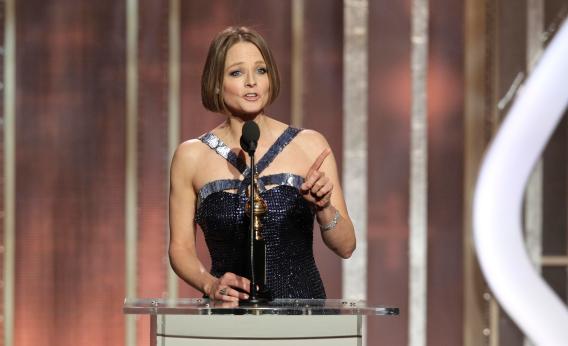Jodie Foster Is Gay, and It’s None of Your Business

Photo by Paul Drinkwater/NBCUniversal via Getty Images
When Sunday’s Golden Globes ceremony reached its celebration of Jodie Foster, the recipient of this year’s Cecile B. DeMille Award for lifetime achievement, the montage of clips from Contact and Nell was predictable. What was not predictable was Foster’s acceptance speech, at once charming, forthright, swerving, a little unhinged and strangely elegant. In it, Foster thanked all the usual colleagues up front, but then she quickly moved into a much more personal register in which, through making a joke about her new status as a single lady, she kind of, sort of, maybe a little bit came out of the closet. Annoyingly, the internet quickly went bananas trying to decide if Foster’s statement was militant enough to count, and so I was pleased when she went on to eloquently explain just why her romantic life should be none of our business.
Of course, as anyone who’s been following Foster’s career knows, she’s been essentially unguarded about her lesbianism for some time—at least, as Buzzfeed points out, since acknowledging her longtime partner in 2007. But she has never made an outright political statement of the sort increasingly popular among gay celebrities today.
In her speech, Foster seemed to take issue with the expectation—from LGBT activists and elsewhere—that simply because she’s a public figure, her personal life is anyone’s business but those with whom it directly intersects. "I already did my coming out back in the Stone Age,” she said. “In those very quaint days when a fragile young girl would open up to trusted friends and family and co-workers and then gradually and proudly to everyone who knew her – to everyone she actually met." She then bemoaned the decline of this kind of privacy, pointing out that when you’ve been in the public eye as long as she has, a modicum of the stuff is required to keep you sane.
I say we let her have it. As far as I’m concerned, as long as a gay person hasn’t been actively pretending to be straight (like a number of people in that hall tonight are probably doing), I don't think she is required to be an activist or even a "role model" for younger LGBT people if she doesn’t wish to be. It is, of course, wonderful when big names like Zachary Quinto and Anderson Cooper have the courage to give up their hetero-privilege in a public pronouncement, and undoubtedly the increasing recognition that so many of our culture-makers are gay has the power to challenge perceptions. But in the midst of the noisy demand that celebrities be “loud and proud,” as Foster put it, the ostensible endgame of the LGBT equality movement can get drowned out: the ability to live our lives as we wish, freely and gently, in peace.
On that stage on Sunday, Foster was amazingly honest about who she is: A nervous, slightly awkward 50-year-old woman who loved her work, adores her sons, grieves for her ailing mother and feels fondly for her ex-partner. She is a person looking on to the next stage of her life—one that she hopes will be “quiet and delicate” and not “so very lonely.” Do we really need to pry for anything more than that?
